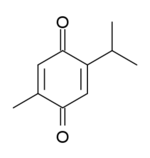Thymoquinone
Thymoquinone is a phytochemical compound found in the plant Nigella sativa. It is also found in select cultivated Monarda fistulosa plants grown in the U.S. and steam distilled producing an essential oil.
 | |
| Names | |
|---|---|
| IUPAC name
2-Isopropyl-5-methylbenzo-1,4-quinone | |
| Other names
Thymoquinone | |
| Identifiers | |
CAS Number |
|
3D model (JSmol) |
|
| ChEMBL | |
| ChemSpider | |
| ECHA InfoCard | 100.007.020 |
PubChem CID |
|
CompTox Dashboard (EPA) |
|
InChI
| |
SMILES
| |
| Properties | |
Chemical formula |
C10H12O2 |
| Molar mass | 164.204 g·mol−1 |
Except where otherwise noted, data are given for materials in their standard state (at 25 °C [77 °F], 100 kPa). | |
| Infobox references | |
In laboratory experiments in cells and in animals, it has shown antiinflammatory and antioxidant effects, and has been studied in models of cardiovascular diseases and diabetes,[1] neurodegenerative diseases and stroke,[2] and cancer.[3] A 2016 study suggests thymoquinone may have opioid tolerance-reduction effects.[4]
It has been classified as a pan-assay interference compound, which binds indiscriminately to many proteins.[5]
See also
- Dithymoquinone, a dimer of thymoquinone
- 2,5-Dimethoxy-p-cymene
References
- Farkhondeh T, Samarghandian S, Borji A (September 2017). "An overview on cardioprotective and anti-diabetic effects of thymoquinone". Asian Pacific Journal of Tropical Medicine. 10 (9): 849–854. doi:10.1016/j.apjtm.2017.08.020. PMID 29080612.
- Khazdair MR (2015-01-01). "The Protective Effects of Nigella sativa and Its Constituents on Induced Neurotoxicity". Journal of Toxicology. 2015: 841823. doi:10.1155/2015/841823. PMC 4641935. PMID 26604923.
- Asaduzzaman Khan M, Tania M, Fu S, Fu J (August 2017). "Thymoquinone, as an anticancer molecule: from basic research to clinical investigation". Oncotarget. 8 (31): 51907–51919. doi:10.18632/oncotarget.17206. PMC 5584300. PMID 28881699.
- Hosseinzadeh H, Parvardeh S, Masoudi A, Moghimi M, Mahboobifard F (2016). "Attenuation of morphine tolerance and dependence by thymoquinone in mice". Avicenna Journal of Phytomedicine. 6 (1): 55–66. PMC 4884218. PMID 27247922.
- Baell JB (March 2016). "Feeling Nature's PAINS: Natural Products, Natural Product Drugs, and Pan Assay Interference Compounds (PAINS)". Journal of Natural Products. 79 (3): 616–28. doi:10.1021/acs.jnatprod.5b00947. PMID 26900761.
This article is issued from
Wikipedia.
The text is licensed under Creative
Commons - Attribution - Sharealike.
Additional terms may apply for the media files.